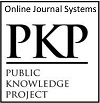OVERVIEW OF PIRATED SOFTWARE ON CAMPUS: EDUCATORS' PERSPECTIVE
Abstract
This research was conducted in order to get an overview from the teaching staff on pirated software. The results acquired were an overview about pirated software, the use of pirated software, the price and willingness to switch to original software. In general, the perception of respondents stated that they knew about pirated software (66.67%), those who did not know (28.07%) and a small proportion were still in doubt (5.26%) regarding this matter. However, almost half of the respondents said that they did not know that the laptop used pirated software (49.12%) and those who knew about it are 21.05%. Small proportion of respondents (19.82%) are still in doubt whether their laptop uses pirated software or not. Respondents who agree (62.28%) original software is expensive, are willing to buy (72.81%) do not want to buy and are hesitant (20.18%). Respondents who disagreed (17.54%) original software was expensive, hesitant to obtain it legally (7.02%). The use of pirated software takes other people's rights (77.19%) and also violates the Copyright Law (79.82%) and disagrees (12.28%) on this. Respondents who were still in doubt were 10.53% and 7.89%. Respondents want to switch (72.81%), not willing (7.02%). The hesitation to move is 20.18%. Only a small proportion (27.19%) of respondents who do not know where to buy it, those who know (41.23%). Not sure where to get it (31.58%).
Keywords
Full Text:
PDFReferences
A. Mardalis and D. P. S, “Faktor-Faktor Yang Mempengaruhi Penggunaan Software Bajakan Di Kalangan Mahasiswa,” BENEFIT J. Manaj. dan Bisnis, vol. 16, no. 2, pp. 99–105, 2012.
U. DAMAYANTI, “Tinjauan Kriminologis Pembajakan Produk Microsoft (Windows 7) Di Kalangan Mahasiswa Universitas Tadulako,” J. Ilmu Huk. Leg. Opin., vol. 3, no. 3, 2015.
A. P. Wicaksono and D. Urumsah, “Perilaku Pembajakan Produk Digital: Cerita Dari Mahasiswa di Yogyakarta,” J. Apl. BISNIS, vol. 17, no. 1, pp. 22–42, 2017.
F. H. Utami and Asnawati, Rekayasa Perangkat Lunak. Yogyakarta: Deepublish, 2015.
B. Satya, “Mengenal Sistem Operasi Yang Beredar Disekitar Kita,” J. DASI, vol. 11, no. 2, pp. 19–32, 2010.
P. H. Suputra, “Penggunaan Perangkat Lunak Berlisensi Publik,” JPTK, UNDIKSHA, vol. 7, no. 2, pp. 29–38, 2010.
G. C. A. Kansil, “Perlindungan Hukum Terhadap Hak Cipta Programmer Dari Pembajakan Program Komputer,” Lex Priv., vol. VI, no. 6, pp. 37–44, 2018.
M. Sari, R. S. Sadjad, and M. Nadjib HM, “Tinjauan Hukum Media Massa Terhadap Penggunaan Software Bajakan Dikalangan Mahasiswa Di Kota Makassar,” J. Komun. KAREBA, vol. 1, no. 4, pp. 399–410, 2011.
D. Suryahartati, “Telaah Normatif Terhadap Lisensi Program Komputer Menurut Undang-Undang Nomor 19 Tahun 2002 Tentang Hak Cipta,” J. Ilmu Huk. Jambi, vol. 2, no. 1, pp. 16–30, 2011.
N. K. Sari, “Penegakan Hukum Terhadappelanggaran Hak Cipta Pembajakan Software Di Indonesia,” J. Ilm. Ilmu Huk. QISTI, vol. 6, no. 1, pp. 14–24, 2012.
S. Muzid and M. Munir, “Pengaruh Penggunaan Software Open Source Terhadap Pembajakan Software: Perspektif Mahasiswa,” in SNATI 2006, 2006, pp. 79–88.
H. Paserangi, “Harmonisasi Hukum Hak Cipta Program Komputer dengan Kultur Hukum Masyarakat Indonesia,” MMH, vol. 40, no. 3, pp. 313–324, 2011.
N. A. Rakhmawati, “SOFTWAREOPEN SOURCE, SOFTWARE GRATIS?” JUTI, vol. 5, no. 1, pp. 13–18, 2006.
Supanto, “kebijakan hukum pidana dalam penanggulangan pembajakan perangkat lunak komputer,” Mimb. Huk., vol. 19, no. 3, pp. 335–485, 2007.
A. Muqorobin, “Penggunaan Software Bajakan Di Lembaga Keuangan Syariah Dalam Perspektif Kepemilikan Islam (Studi Kasus Bmt Surya Mandiri, Ponorogo Tahun 2018),” in Manajemen, Akuntansi dan Perbankkan 2018, 2018, pp. 1003–1016.
DOI: http://dx.doi.org/10.22373/cj.v4i2.7717
Refbacks
- There are currently no refbacks.
Copyright (c) 2020 Basrul Abdul Majid
except where otherwise noted.






















